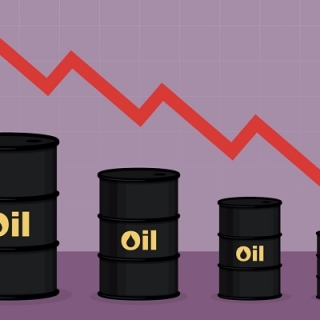


Oil prices weakened on Tuesday (August 5th) on concerns about oversupply as OPEC+ continued significant production increases despite a weak demand outlook. This increase was more than enough to offset potential tightening of the Russian oil trade due to US policy.
Brent crude futures fell 11 cents, or 0.16%, to $68.65 per barrel at 04:24 GMT. US West Texas Intermediate crude futures fell 12 cents, or 0.18%, to $66.17 per barrel.
This was the fourth consecutive decline for both contracts, which had previously fallen more than 1% in the previous session and hit their lowest levels in a week. Both benchmarks have weakened as additional capacity from OPEC+ acts as a buffer against Russian supply shortages, said Priyanka Sachdeva, senior market analyst at Phillip Nova.
The Organization of the Petroleum Exporting Countries (OPEC) and its allies, known as OPEC+, agreed on Sunday to increase oil production by 547,000 barrels per day for September. This marks a full and initial reversal of the group's largest production cuts, which amounted to about 2.5 million barrels per day, or about 2.4% of global demand, although analysts warn the actual amount returning to the market will be less.
This increase in supply is coupled with concerns about demand, with some analysts predicting slower economic growth in the second half of the year. JPMorgan analysts said on Tuesday that the risk of a US recession is high as labor demand has stagnated. Furthermore, China's Politburo meeting in July signaled no additional policy easing, with the focus shifting to structural rebalancing of the world's second-largest economy, the analysts wrote in a note.
The outlook for weak economic fundamentals overshadows concerns about possible supply disruptions that have previously supported oil prices. US President Donald Trump has said he could impose 100% secondary tariffs on buyers of Russian crude oil, such as India, after announcing 25% tariffs on Indian imports in July.
On Monday, Trump again threatened higher tariffs on Indian goods over purchases of Russian oil. New Delhi called his attack "unjustified" and vowed to protect its economic interests, deepening a trade rift between the two countries.
India is the largest buyer of seaborne crude oil from Russia, importing about 1.75 million barrels per day from January to June this year, up 1% from a year ago, according to data provided to Reuters by trade sources. Traders are also awaiting developments on the latest US tariffs on its trading partners, which analysts fear could slow economic growth and reduce fuel demand. (alg)
Source: Reuters
Oil prices stabilized on Thursday (February 12th), as the market reassigned a risk premium to US-Iran tensions despite US inventory data showing swelling domestic supplies. This movement confirms one ...
Oil prices rose on Wednesday (February 11th), supported by a combination of geopolitical risk premiums from US-Iran tensions and more solid Asian demand signals particularly from India which helped ea...
Oil remained in the green zone on Tuesday (February 10th), as the market refused to abandon the Middle East risk premium. As of 13:07 GMT (20:07 WIB), Brent rose +0.4% to $69.32/barrel, while WTI rose...
Oil prices fell about 1% on Monday as concerns about conflict in the Middle East eased slightly. The market calmed after the US and Iran agreed to resume talks on Tehran's nuclear program, reducing fe...
Oil prices moved slightly higher in a volatile session on Friday, as investors assessed the direction of nuclear negotiations between the United States and Iran. Price movements appeared sensitive to ...
Oil prices stabilized on Thursday (February 12th), as the market reassigned a risk premium to US-Iran tensions despite US inventory data showing swelling domestic supplies. This movement confirms one thing: geopolitical headlines are still more...
Gold prices weakened slightly on Thursday (February 12th), as more solid US employment data reduced market confidence in an imminent Federal Reserve interest rate cut. The strong employment data prompted market participants to shift expectations of...
The Hang Seng Index reversed its downward trend in Hong Kong on Thursday (February 12th), weakening by around 0.9% to around 27,000 after a strong session earlier. This decline halted the momentum of the short term rally, as investors began to...